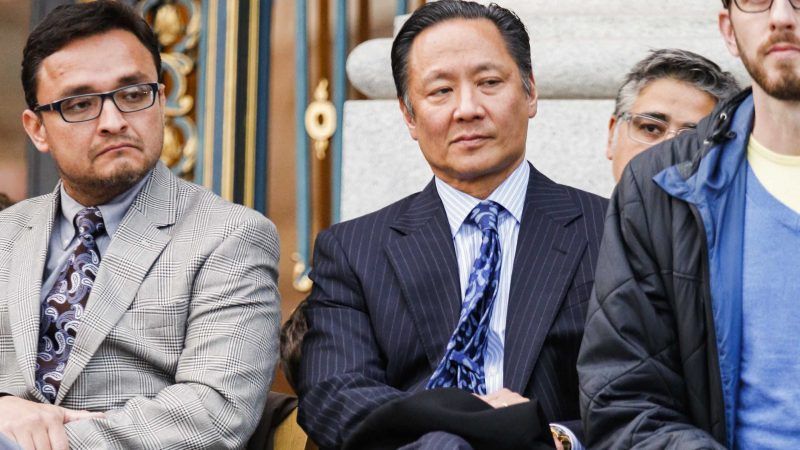Police Raid on Journalist's Home Has Grave First Amendment Implications
Bryan Carmody refused to name the source of a leaked police report.

When San Francisco police arrived at journalist Bryan Carmody's apartment last week, they smashed the building's gate with a sledgehammer, placed him in handcuffs, and raided his home with guns drawn.
They left with his notebooks, computers, phones, and various other electronic devices, as well as a police report on the death of Jeff Adachi, the city's public defender.
"I knew what they wanted," said Carmody in an interview with the Los Angeles Times. "They wanted the name."
That is, they wanted the name of the person who leaked the police report to Carmody, who then sold it to three local news outlets. His company, North Bay News, tracks stories overnight and sells the resulting footage and information to television stations for their round-the-clock coverage.
Agents had attempted to identify his source several weeks prior; Carmody says he "politely" declined to provide it. The department then sought warrants for the raid, raising serious First Amendment concerns around Carmody's protections as a journalist.
The police report about the death of Adachi—whose reputation was defined by his penchant for criticizing the police—provided gossipy fodder for San Francisco's local news in late February. Laden with a string of scandal-ridden details about his final moments, it said he had been with a woman who wasn't his wife in an apartment that had "cannabis gummies," "empty bottles of alcohol," as well as an "unmade bed"—the latter of which was widely publicized with photographs. The salacious and often irrelevant specifics, later leaked to several journalists, sparked speculation that the police department was looking for the last laugh against the city's top public defender, who wasn't exactly known for making their jobs any easier.
"There were leaks happening all over the place," Carmody told the L.A. Times.
But the particulars of the police-Adachi feud are no longer of import to Carmody. What does matter to him are the circumstances surrounding his confiscated equipment, without which he cannot run his company.
The raid may have broken California state law, which shields journalists from being held in contempt for declining to name a source. It also excludes protected items from being subject to search warrants.
But those warrants—one for his home and the other for the office of North Bay News—were issued in spite of Carmody's professional background. "It's possible that the courts decided that because Carmody is a freelancer, he is not subject to the shield law," Aaron Field, an attorney with the Northern California chapter of the Society of Professional Journalists, said in an interview with the San Francisco Examiner. "That is not correct."
Police Commissioner John Hamasaki tells the Examiner that the information was not obtained "in the context of his duties as a reporter," but as a salesman. That's a dubious assumption at best: Although Carmody lacks a specific platform, his work is clearly journalistic in nature. A disregard for his First Amendment protections is not justifiable—it's merely convenient.
That's not lost on NoCal's Society of Professional Journalists, which conceded in a statement that "news organizations should disclose when content has been provided by outside sources, whether paid or not." Carmody's business model gives them ethical pause—perhaps for good reason. But that doesn't justify the police department's recourse.
"While there may be legitimate questions on the circumstances surrounding the reporting of Adachi's death, the seizure of any journalist's notes or other reporting materials sets a dangerous precedent," the statement continued. "An attack on the rights of one journalist is an attack on the rights of all journalists."


Show Comments (56)